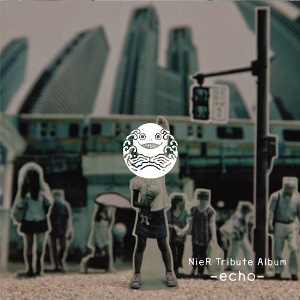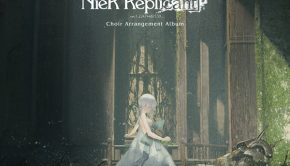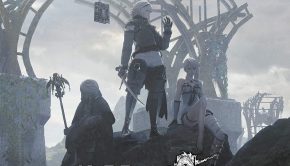Nier Tribute Album -Echo-
 |
Album Title: Nier Tribute Album -Echo- |
| Record Label: Square Enix |
|
| Catalog No.: SQEX-10247 |
|
| Release Date: September 14, 2011 |
|
| Purchase: Buy at CDJapan |
Overview
The Nier Tribute Album -Echo-, while not exactly an entry in the SQ series, is, in a way, a similar type of arrange album, featuring works of many contemporary artists who are unknown in the video game music field. However, this album has the talents of Nobuyoshi Sano and Takayuki Aihara, who had previously composed the experimental Drakengard soundtrack for cavia. How does the album, which focuses on the beloved Nier Gestalt and Nier Replicant soundtracks, turn out? Will it garner the attention of fans or does it do a disservice to the original soundtrack?
Body
The album opens up with a remix by SEXY_SYNTHESIZER. His remix, “Repose” takes the original acoustic vocal piece and transforms it into a very fitting opening for the album and gives a nice “preview” of things to come. Focusing on deep electronic beats, ethereal vocals, and chiptune accompaniment, the original is heightened through the clever manipulation of these elements. While it is a bit long and repetitive, clocking in at over six minutes long, the track never manages to overstay its welcome, due to its intoxicating soundscape.
Go-qualia’s “Suite of Nier,” which is officially titled “Restructuring – Snow in Summer, The Ultimate Weapon, Ashes of Dreams,” provides a medley of these three themes in an industrial soundscape. The majority of the remix focuses on “Snow of Summer,” providing a haunting atmosphere heightened by pounding industrial beat. When it comes to “The Ultimate Weapon” portion, I am immediately reminded of Nobuyoshi Sano’s more distorted works on the Drakengard soundtrack as the vocals and electronic components are distorted very heavily; however, it only serves as a small portion of the remix, for those who find this type of sound alarming. In a way, it serves as a tribute to past cavia titles. When it comes to the last portion of the melody, the ending vocal “Ashes of Dreams,” Go-qualia chooses to use the Japanese version and incorporates the industrial sounds heard previously in the mix as well as some electronic distortion. In the end, it manages to come off as a bit disturbing, but it does showcase some experimentation not heard elsewhere on the album.
Ametsub’s variation of the “Sacrifice” version of Emil’s theme also provides some electronic distortion, but not to the extent of Go-qualia’s contribution. It’s a beautiful theme that features a soft electronic base, some noisy accompaniment, and the gorgeous vocals of the original. To some, it may seem a bit muddled at time, and rightly so, given how much can be going on at times; however, the majority of the tune, which focuses on beautiful synthesizer tones, manages to capture the spirit of the original, even if it’s done in a slightly unorthodox fashion. “Temple of the Drifting Sands” is definitely one of the best remixes on the album. Taking the original, which provided an intoxicating yet ethereal soundscape, millstones transforms the original into an upbeat, electronic theme with some drum n’ bass and classical jazz piano that both manage to complement one another as well as Emi Evans’ beautiful vocal performance. It’s one of those remixes that will have you bobbing your head to the rhythmic percussion and wishing the track wouldn’t end.
Another remix regarded quite highly on the album is sasakure.UK’s remix of the Devola and Popola variations of the “Song of the Ancients.” His remix also takes the electronic approach, providing a mix of soft electronic tones and dance beats. As with millstones’ remix, piano also plays a strong focus throughout this remix, providing some slick classical jazz passages that really manage to bring a real strength to the remix. In addition, beautiful strings harmony that mirrors the original melody and its tempo are thrown into the mix. The best passages, in my opinion, are the ones that focus mainly on that slick piano work and Emi Evans’ vocals; however, the more electronically focused passages that implement all of the above also manage to provide an exhilarating listen. Overall, this is probably the best thing I’ve heard by sasakure.UK, who has previously contributed to an SQ album, and will provide the upcoming theme song for SEGA’s 7th Dragon 2020 game.
There are also some remixes that tend to follow similar approaches. Matryoshka takes the two Kaine variations “Salvation,” the melancholy, piano driven original, and “Escape,” the action-oriented take on the Kaine theme, and transforms it into a down-tempo, ethereal, and warming imagining of the theme. While it doesn’t do as much as some of the other remixes, its simplicity serves as one of its strengths, providing an interesting soundscape of piano, light industrial noise, and strings to Emi Evans’ vocal work. The other remix in this fashion is KanouKarou’s “The Wretched Automatons ~ Hills of Radiant Wind,” manages to provide a nice ethereality through its slower tempo renditions of the originals; however, while beautiful, it doesn’t really manage to stand out amongst the more complex and rich arrangements offered by other contributors. Compared to other tracks, these are the weakest tracks on the album.
Two of the remixes opt for non-electronic focuses. The first, by a group named RÄFVEN,” takes the haunting “Shadowlord’s Castle / Roar” and transforms it into a very Eastern European/Russian folk remix. Out of all the tracks, this one stands out the most in terms of style. While I do enjoy the remix, something I didn’t expect after hearing the sample, I can see why some would find it a bit jarring. It’s an energetic track featuring a ton of brass, accordion, and strings work. It’d be something you’d expect to hear out on the snowy streets of Moscow or in a gypsy camp somewhere. The other, Schroeder-Headz’s “Grandma,” enhances the melancholy piano-laden original by providing a more classically oriented piano accompaniment. While it is more of a reimagining of the original, rather than a pure remix, I think the more complex piano work, as well as the beautiful instrumental piano bridges, truly does make the theme shine.
The two previous cavia contributors Nobuyoshi Sano and Takayuki Aihara, under aliases Nobu44 and NO-NO2, respectively, provide some of my favorite contributions as well. Sano’s “The Incomplete Stone” is a fun romp that reminds me, in some ways, of his remixes on the Persona 3 Portable Voice Mix Album. There is an intoxicating rhythm, some quirky synthesizer accompaniments that are definitely reminiscent of the 1980s at times, and some vocoder distortion of the original male choral work. The beat has a slight industrial sound to it and really works well with the elements Sano incorporates into the mix. I could listen to this one all day. Aihara’s rendition of “The Lost Forest” is equally beautiful, although his remix takes a more electro-acoustic approach. Featuring beautiful woodwind work, stunning piano elements, and ethereal and distorted electronic work, it manages to combine these three components to create an absolutely exquisite soundscape with a very worldly atmosphere. This is definitely the best remix on the album, if you ask me, and makes me wish that Aihara were more active in the arrangement scene. His eye for detail is impeccable and despite incorporating so many elements, he does it without making it sound muddled or overdone.
The album closes with world’s end girlfriend’s rendition of “Snow in Summer” and “The Dark Colossus Destroys All.” It’s an extremely intriguing remix that, by the end of the remix, have some people disliking its progression, but for those with an ear for experimentation, it may end up being a fruitful listen. The majority of the arrangement focuses on “Snow in Summer.” It’s quite interesting and something that I quite enjoy, especially when there is distortion added to vocal samples thrown into the mix from time to time. Some of the more pristine moments focus solely on the boys choir and piano; however, I find them to be a bit vanilla. As the theme progresses into “The Dark Colossus Destroys All,” the tone of the track definitely becomes much darker and chaotic. Focusing on dark piano passages, some drum n’ bass work, frenetic Castlevania-like strings work, distorted electronic beats, haunting and powerful choral work, and some brass accents, it’s quite a trip that I wish the whole arrangement would have been based on. This theme may not be everyone’s cup of tea, especially in the last minute where things become extremely distorted and noisy, but overall, I find the track to be a stunning way to close the album in quite an unorthodox fashion!
Summary
When I first heard of this album, which has been described as a Nier SQ of sorts, I was quite skeptical. Given how much I love the original soundtrack and how lacklustre I find the SQ series of arrange albums, I was not really expecting that much. That skepticism was reduced a bit when my friends at MONACA told me that Nobuyoshi Sano and Takayuki Aihara would be involved on the album, given their previous connections with cavia soundtracks. The rest of the album would comprise of artists who had previously contributed to some of the SQ albums and some new ones joining just for this album. However, in the end, I can say that I am pleasantly surprised. While some remixes don’t do as much as I’d like, they manage to carry the atmosphere of Nier with them, with the exception of the “Shadowlord’s Castle / Roar,” which does feel out of place on this mostly electronic and classically oriented album. If you are a fan of the original, I recommend this album as there are quite a lot of neat things done to the originals, but be aware that it does not attain the status of the original soundtrack.
Do you agree with the review and score? Let us know in the comments below!
4
Posted on September 14, 2011 by Don Kotowski. Last modified on September 20, 2014.














